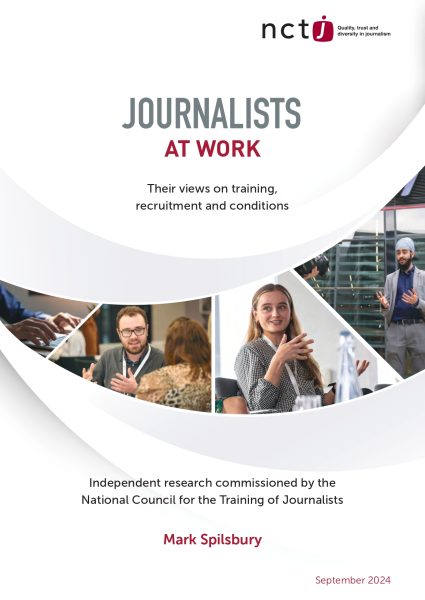
NCTJ launches landmark Journalists at Work 2024 report
Exploring AI, safety and wellbeing, and remote working for the first time.
The NCTJ has unveiled the latest Journalists at Work report today at a special event hosted by Reuters in London.
 This in-depth research, the first since 2018 and the fourth edition in the series (following reports from 2012 and 2002) offers critical insights into the evolving nature of journalism in the UK.
This in-depth research, the first since 2018 and the fourth edition in the series (following reports from 2012 and 2002) offers critical insights into the evolving nature of journalism in the UK.
The independent research is commissioned by the NCTJ and authored by Mark Spilsbury.
The report draws on comprehensive data gathered from more than 1,000 journalists, highlighting some of the key opportunities and challenges facing the industry, such as:
- Diversity in journalism: The report highlights an ongoing lack of diversity in the industry, with 91 per cent of journalists coming from white ethnic groups, compared to 86 per cent of the overall UK workforce. Journalists are also much more likely to come from higher socio-economic backgrounds, with many having a parent or head of household who worked in a higher-level occupation.
- Unpaid work experience: The reliance on unpaid work experience continues to raise concerns about fairness and accessibility for aspiring journalists. The report shows that, although declining, 66 per cent of new entrants undertook work experience before gaining their first paid job, with 88 per cent of those roles being unpaid.
- Decline in print journalism: The findings reveal a significant shift away from print platforms. Only 17 per cent of journalists now develop content for print as their main platform, a stark decline from 45 per cent in 2012, reflecting the growing dominance of digital media in the industry.
- Training and skills development: The findings emphasise the growing need for upskilling in areas such as artificial intelligence (AI) and leadership training. Sixty per cent of journalists report they do not have a sufficient understanding of how AI could assist their journalism, and only 47 per cent of journalists with management or leadership responsibilities have received formal training in these areas.
- Remote working: The post-pandemic shift to working from home has significantly impacted newsroom dynamics, with only 11 per cent of journalists saying they never work from home. This is seen favourably overall, though issues relating to isolation and a reduced ability to learn from others are noted.
- Journalism safety and wellbeing: As threats to journalists’ safety become of growing concern, the report reveals that over half (51 per cent) of journalists have experienced abuse, harassment, or violence in their work, underscoring the need for enhanced support and protection in the field.
Ian Hargreaves, professor emeritus at Cardiff University’s School of Journalism, said: “The legacy of these reports merits careful attention by everyone who holds a stake in the quality and reputation of UK journalism.”
He added that, despite the concerns raised by the report, “Journalists remain resilient in their work with strong levels of job satisfaction and retention.
“A clear indicator of this positive frame of mind is the reported answer to the question of whether they would recommend the profession to a young person. Sixty-three per cent say they would.”
Joanne Forbes, chief executive at the NCTJ, said: “This fourth edition of Journalists at Work provides an invaluable snapshot of the current state of journalism in the UK.
“As the landscape of journalism continues to change, the NCTJ must remain open-minded and adaptable in its approach to training and qualifications. This means not only equipping journalists with the skills needed to succeed in a digital-first world but also ensuring that the profession is open and accessible to a more diverse range of candidates.
“By addressing the gaps in management training, supporting ethical journalism, and prioritising the wellbeing of those in the field, the NCTJ promises to play a pivotal role in shaping the future of the profession.”
In response to the report’s findings, the NCTJ has launched a new online training course on working from home. The e-learning course, available via the Journalism Skills Academy, aims to guide journalists through the benefits and challenges of remote working, including how to build relationships via virtual channels and identify and overcome proximity bias. Find out more.
Click here to read the full Journalists at Work 2024 report.

